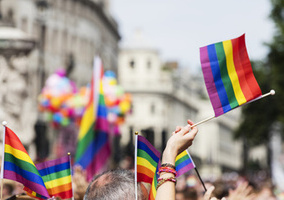#CharitySoWhite (CSW) was set up in August 2019 to campaign against racism in the charity sector.
Since then, it has garnered over 18,000 followers on Twitter, been reported on by the national press, and become one of the most influential organisations on anti-racism in the sector.
Despite the organisation’s success, Jon Cornejo, an organiser at CSW, says the way charities interact with the campaign can be problematic.
“We don't want to be the ‘go-to’ people for this. We want leaders to talk to the people who are already in their organisations and are being ignored,” Cornejo explains.
A group of around seven people work on the CSW campaign, all in a voluntary capacity. Its only funding comes from the public.
“We want to clarify that we are here to campaign for a better charity sector,” he says, as many approach the group for anti-racism consulting, a service they do not provide.
Many charities have approached the campaign group looking for a “stamp of approval” that they are anti-racist and ask for use of the CSW’s logo. A lot of people want the group to endorse specific charities, too, but this comes with risks, so is something they tend to avoid.
“You might say one month that this organisation is going really well and then some sort of scandal breaks. There's always more to the story. So, it is a very long journey and I don’t think any organisation will ever get to a place where they say that they are an anti-racist organisation.”
‘Racism made me leave the sector’
Cornejo worked in the charity sector for almost nine years, most recently as head of communications and campaigns at UK Welcomes Refugees. Before that, he was a campaign manager at Save the Children UK.
He worked in campaigns at Amnesty International UK for over five years, a charity which an independent inquiry recently found holds a culture of racism and white privilege.
Last year, Cornejo left the charity sector to work in anti-racism consulting at JMB Consulting. What pushed him to leave was his experiences of racism, he says.
Cornejo, who is of Latin American heritage, says he experienced microaggressions due to his race at some of his former charity employers.
“It can just be so subtle,” he says. “There were times where it felt like more resources were given to campaigns being led by white peers as opposed to me. There were content-gathering trips where there were more questions raised around safety and whether I was competent enough to do that.
“It felt like there were always barriers in the way and there's sort of this constant messaging that you don’t belong, or you’re not like us. And that’s ultimately the thing that really pushed me out of the sector.”
In the end, Cornejo left the sector, and says he knows many people who have done the same due to their experiences of racism.
“People end up thinking if I need to go somewhere else to be myself and be happy, then that’s what I’ll do, even though all of us are very driven by the mission and believe in what these organisations are doing. It isn’t an easy decision to leave that behind.”
‘If the charity sector doesn’t change, it will be left behind’
Despite its success, CSW has experienced some backlash with people asking why it was necessary at all, Cornejo says.
“Even from the very start there was quiet whispering amongst leadership and different parts of the sector and feelings that we shouldn't be having this conversation. You know, the charity sector does good. Why are you calling us racists and all this stuff? Why are you anti-charity? But I don't think there's been a huge amount that's been very direct and open and public.”
However, the “love is so much louder than the critique” of the campaign, he says.
To anyone who thinks discussing anti-racism in the sector is anti-charity, Cornejo says “we have to have these conversations to continue existing.”
“Charity as it has been, and white saviour narratives that have existed within the sector are not viable. The sector has moved on very heavily from the kindness flies in their eyes, the desolate-looking imagery of Africans in poverty. There's been a lot of work has been done and must continue.
“If the charity sector doesn't change and transform with the times and keeps going for an ageing population, and ideals that are very much stuck in the past, then they're going to be left behind.”
How can charities become anti-racist organisations?
There are lots of things that charities can do to work towards becoming an anti-racist organisation and one key facet is representation.
“Look critically at yourselves and your organisation and think who is currently working there? What kind of space is it to work? Are you bringing more diverse staff in?
“A very obvious one is looking across your columns and imagery and thinking where would a person of colour see themselves represented? And often is with the people and communities that you're trying to serve – are they often depicted as victims?
“If that's the dynamic, and that's the imagery that the candidates get throughout, then that's not going to be a place that is going to attract those communities. So, there is some changes in terms of how you represent yourself as a brand and as a company and how you grow into that.”
Luckily, the sector is in a much different headspace than when the campaign was first set up, Cornejo believes, with many charities working to address institutional racism. But there is still much more to be done.
‘More energy’ behind the campaign needed
Campaigning against institutional racism has caused burnout for much of CSW, Cornejo says, but the work is not over.
“There needs to be more energy behind this and we don't necessarily, as individuals, have more to give. So, I do think there is a space for more community support and more energy to be put into this. Because often it feels like at some point, this is going to stop and it's going to go away and those managers that have just been waiting for that, will sigh in relief because they can just get back to what they were doing before.
“But that would be a huge disservice to the Black and brown people that are sitting at their work frustrated about the lack of opportunities and lack of development and all the other things that make being a Black or brown person in the workplace difficult.”
Related articles












